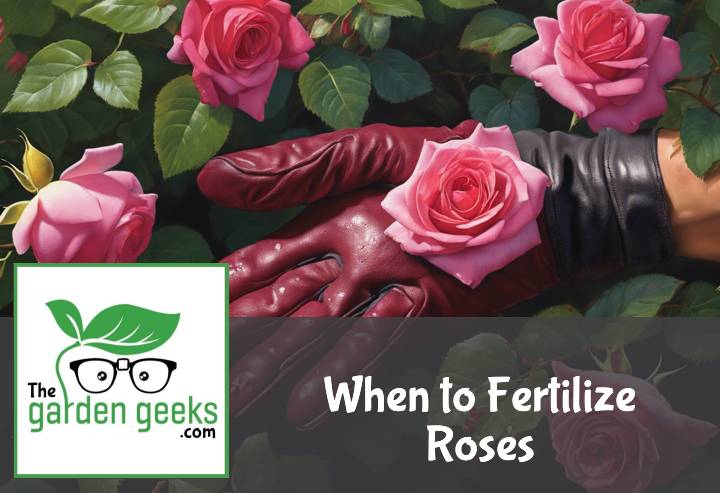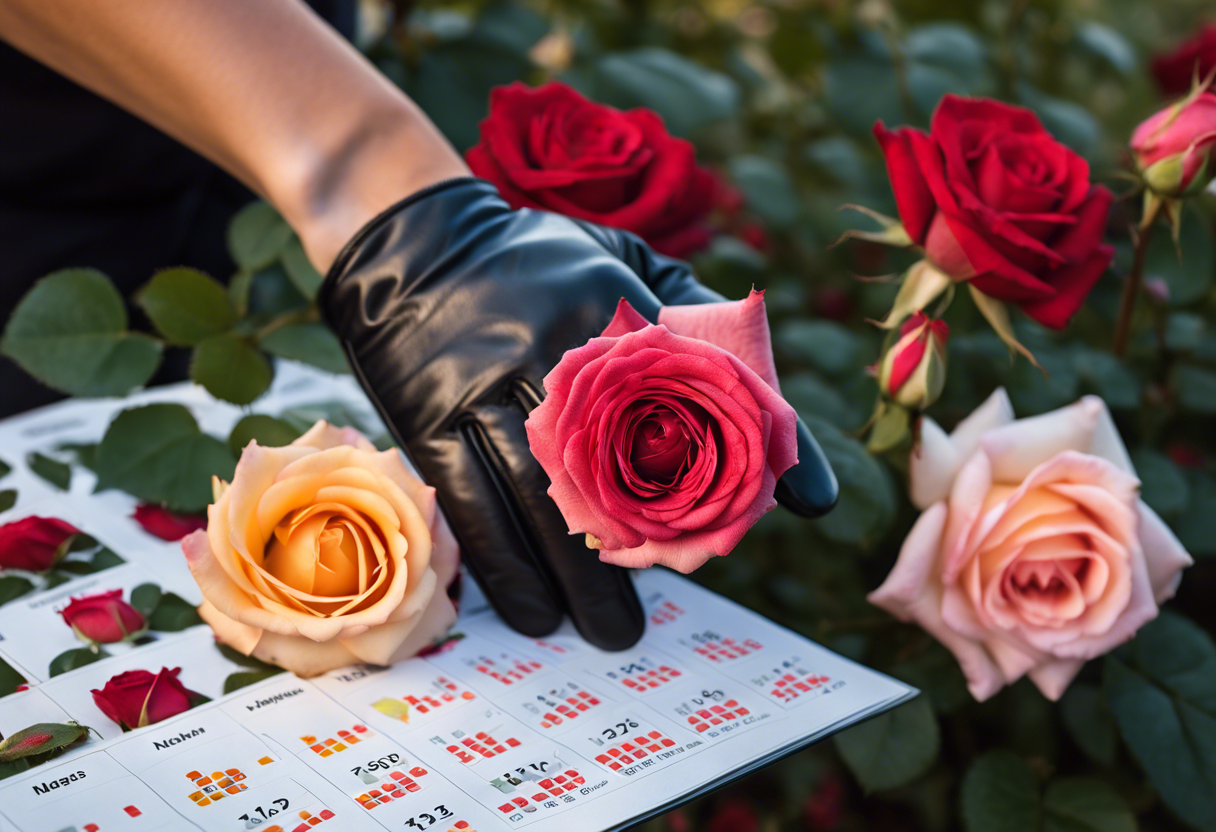Hello there, fellow rose enthusiasts! Ever wondered about the secret to those blooming beauties in your neighbor’s garden? Well, it’s all in the timing – specifically, knowing When to Fertilize Roses.
Now I know what you’re thinking, “Isn’t feeding roses just about tossing some compost their way?” Oh, how I wish it were that simple! But fret not, this definitive guide will help you master the art of rose fertilization. So buckle up and let’s get started! Keep reading about When to Fertilize Roses (The Definitive Guide).
Key Takeaways
- The best time to fertilize roses is in early spring, just as they’re starting to grow.
- Fertilize again after the first bloom cycle and once more in mid-summer.
- Avoid fertilizing late in the season as it can cause new growth that may be damaged by winter frosts.
- Use a balanced rose fertilizer for optimal results.
- Over-fertilization can harm roses, so follow package instructions carefully.
Understanding the Importance of Fertilizing Roses
Well, folks, let’s talk about rose care. It’s no secret that roses are a bit high maintenance. But hey, who isn’t? The importance of fertilizers in rose gardening can’t be overstated. It’s like giving your roses their favorite food to keep them healthy and blooming.
Why Do Roses Need Fertilizer?
Roses are like us humans – they need good nutrition for growth and health. Without proper nourishment, they won’t reach their full potential. And we all want our roses to be the best they can be, right?
Fertilizer plays a crucial role in rose growth and rose health. Think of it as a multivitamin for your plants. It provides them with essential nutrients that they might not get from the soil alone.
The impact of fertilizer on roses is pretty significant. When you feed your roses properly, you’ll notice more vibrant blooms and healthier foliage. So if you’re into rose cultivation, remember this golden rule: A well-fed rose is a happy rose!
What Nutrients Do Roses Require?
Now let’s talk about what exactly these divas need to thrive. There are three main nutrients that are absolutely essential for roses: Nitrogen (N), Phosphorus (P), and Potassium (K).
Nitrogen promotes healthy leaf growth by aiding in chlorophyll production (that’s what gives plants their green color). Phosphorus helps with root development and boosts flower production – so if you want those stunning blooms, don’t skimp on the P!
Potassium strengthens the plant overall, helping it resist diseases and survive harsh weather conditions. So when it comes to feeding your roses, make sure they’re getting a balanced diet of N-P-K.
But wait! That’s not all! Roses also need some minor nutrients like magnesium, iron, and manganese. These might seem insignificant, but they play a big role in rose plant nutrition.
So there you have it. The secret to healthy roses is understanding their nutritional needs and meeting them with the right fertilizer. Remember, when it comes to rose care, it’s all about the love…and the nutrients!
Identifying the Right Time to Fertilize Roses
Timing is everything, especially when it comes to rose fertilization. You can’t just wing it and hope for the best. Your rose care schedule should be as precise as a Swiss watch. The optimal time for fertilizing roses depends on various factors such as climate and plant health. So, let’s dive into these topics.
The Role of Climate and Season
Climate plays a significant role in determining the best season to fertilize roses. If you’re living in a tropical area, your roses are probably partying all year round. In this case, they’ll need regular feeding to keep up with their high energy lifestyle.
On the other hand, if you’re dealing with a colder climate, your roses might be more like hibernating bears during winter. They won’t need much food then since they’re not actively growing. But once spring hits and they start waking up from their slumber, that’s when to fertilize roses.
The effect of weather on rose feeding is also crucial. Extreme temperatures can stress out your roses making them less receptive to fertilizer application.
Signs Your Roses Need Fertilization
Roses are pretty vocal about their needs if you know what signs to look for. One common symptom of poor rose nutrition is yellow leaves with green veins – a clear cry for help! This could mean your roses are lacking iron or nitrogen.
Another sign that your roses might need more fertilizer is stunted growth or fewer blooms than usual. It’s like they’re saying “Hey human, we’re running low on fuel here!”
So keep an eye out for these signs of nutrient deficiency in roses because recognizing undernourished ones early can save you a lot of trouble down the line.
Types of Fertilizers Suitable for Roses
When it comes to rose fertilizers, there’s a whole world out there. You’ve got your organic and inorganic options, each with their own unique benefits. Now, don’t get me wrong, both are suitable fertilizers for your roses but they do have their differences.
Organic vs. Inorganic Fertilizers
Let’s start with the organic stuff first. Organic fertilizers for roses are like the home-cooked meals of the plant world. They’re slow-releasing and provide a balanced diet over time. Plus, they improve soil health which is always a bonus! On the other hand, inorganic rose fertilizers are like fast food – quick and easy but not as beneficial in the long run. They can lead to salt build-up in your soil which isn’t great for your roses or any other plants you might have hanging around.
Specific Rose Fertilizers on the Market
Now let’s talk about some specific products out there. There are plenty of best rose fertilizer brands that gardeners swear by. Some popular ones include Miracle-Gro Rose Food and Jobe’s Organics Rose & Flower Fertilizer (great if you’re into the organic thing). These top-rated rose fertilizers offer unique features like easy-to-use formulas and specially designed nutrient blends for roses. So next time you’re wondering ‘when to fertilize roses‘, remember these names!
How Often Should You Fertilize Your Roses?
When it comes to rose care, knowing when and how often to fertilize is key. The frequency of fertilizing roses can greatly impact their health and growth rate. It’s not a one-size-fits-all kind of deal, folks! Factors like rose variety, health, and growth rate play a significant role in determining the ideal fertilization schedule.
Frequency Based on Rose Varieties
Different strokes for different folks – or should I say, different fertilization frequencies for different rose types? Each rose variety has its own unique needs when it comes to nutrition. Some varieties are like teenagers, constantly hungry and needing frequent feedings. Others are more like your grandma who insists she only needs a small salad for dinner.
For instance, hybrid teas and floribundas are high maintenance divas that demand regular feeding. On the other hand, old garden roses and climbers are more laid-back, requiring less frequent fertilization. So remember folks, specific rose care is crucial when deciding how often to feed your blooming beauties!
Adjusting Frequency Based on Health and Growth Rate
Now let’s talk about adjusting fertilizer use based on the health and growth rate of your roses. If you notice your roses looking a bit under the weather or not growing as fast as they should be (yes, plants have bad days too), it might be time to tweak your fertilization routine.
Keep an eye out for signs of poor health such as yellow leaves or lackluster blooms – these could indicate that your roses need more nutrients. Similarly, if your roses are growing slower than molasses in January, increasing the frequency of fertilization could give them the boost they need.
But remember folks – don’t go overboard with the fertilizer! Too much can do more harm than good. It’s all about finding that sweet spot for healthy rose care and optimizing rose growth. So, when it comes to figuring out when to fertilize roses, let your plants do the talking!
Common Mistakes When Fertilizing Roses
Ah, roses! Beautiful, but a bit finicky. Especially when it comes to fertilizing them. There are some common rose care mistakes that folks make. The two biggies? Over-fertilization and incorrect timing.
Over-Fertilization and Its Consequences
Over-fertilizing roses is like overfeeding a pet; it can lead to all sorts of problems. Too much love, in the form of fertilizer, can actually damage your precious blooms. It’s one of those classic rose fertilization errors.
The consequences of too much fertilizer are not pretty. It can burn the roots and leaves, making your rose look more like a Halloween decoration than a garden showpiece. And let’s not forget about the soil. Excessive fertilizer can throw off its balance, making it hard for any plant to thrive.
Incorrect Timing and Its Impact
Now let’s chat about timing because when to fertilize roses really does matter! The wrong time to fertilize roses is just as bad as overdoing it.
Incorrect fertilization timing can mess with your rose’s growth cycle. Imagine waking up at 3 am every day for breakfast – you’d be cranky too! Same goes for your roses; they need their nutrients at the right time to grow healthy and strong.
The effects of a wrong fertilization schedule on roses can be quite dramatic – stunted growth, fewer blooms, even disease susceptibility. So remember folks, timing isn’t just about comedy – it’s crucial in rose plant care too!
To Wrap Up
Well, folks, we’ve journeyed through the rose garden of knowledge together. We’ve sniffed out the facts and pruned away the myths about When to Fertilize Roses.
Remember, treating your roses right is like making a perfect cup of tea – timing and ingredients matter! So, get out there and let’s turn your garden into a bloomin’ masterpiece.





